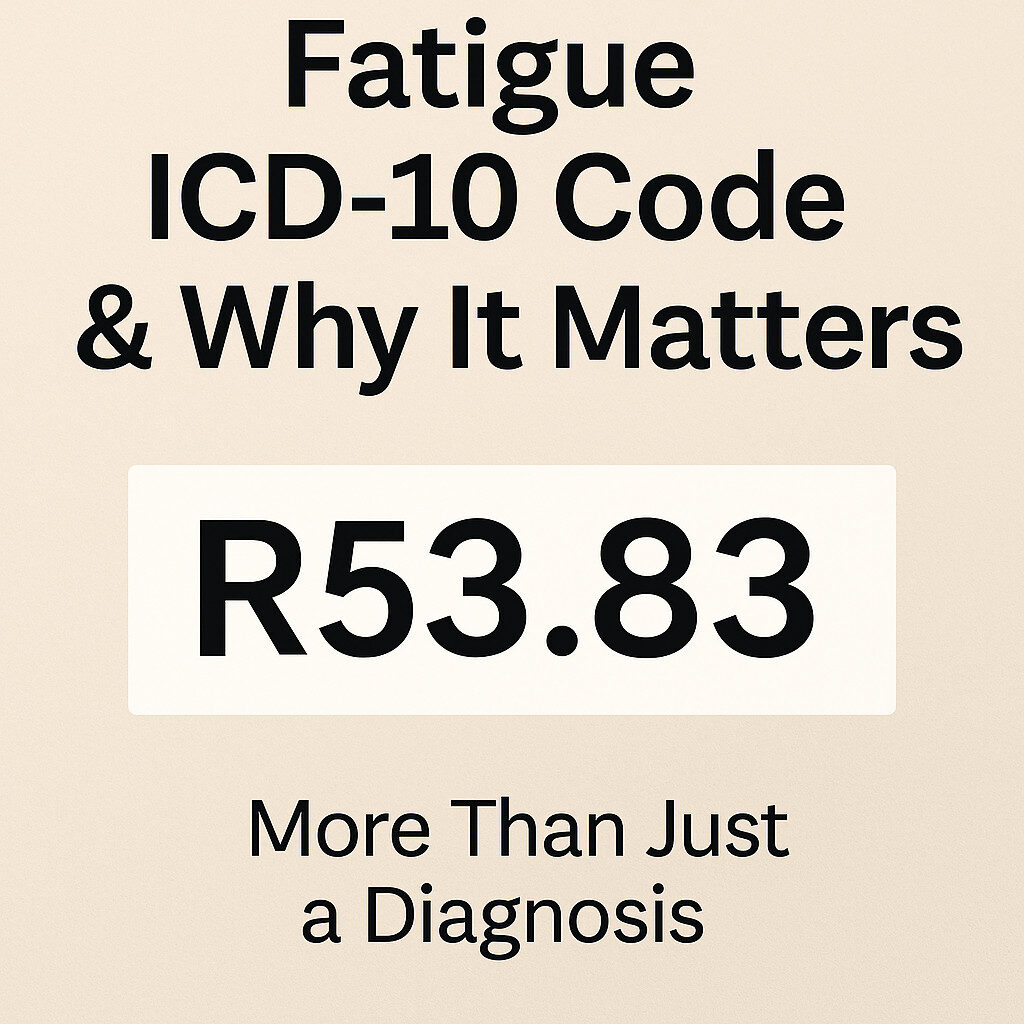Fatigue is one of the most common complaints in modern medicine. But despite how widespread it is, fatigue is often dismissed, misunderstood, or labeled as “just stress.” In conventional care, fatigue gets boiled down to a billing code: ICD-10 code R53.83, the general diagnosis for “other fatigue.”
But here’s what most people, and even some practitioners—don’t realize: that little code is just the tip of the iceberg. Chronic or long term fatigue can be a signal from your body that something deeper is out of balance and needs support. And in functional and naturopathic medicine, we go far beyond coding to find the real cause.
What Is the ICD-10 Code for Fatigue?
The standard ICD-10 code for fatigue is R53.83. This code is used when a patient presents with generalized fatigue or low energy that doesn’t yet have a more specific medical explanation.
Other related and more specific codes include:
- G93.3 – Postviral fatigue syndrome (often used for chronic fatigue syndrome, or CFS/ME)
- U09.9 – Post-COVID condition, unspecified (Long COVID)
These deeper codes acknowledge that fatigue can become chronic, debilitating, and linked to specific post-viral or inflammatory conditions.
What Causes Fatigue?
There are dozens of possible root causes of fatigue, and often more than one is involved. Here are some of the most common ones seen in clinical practice:
Iron Deficiency Anemia
Low iron—especially low ferritin—can leave you feeling drained, weak, and lightheaded. This is especially common in menstruating women or those with poor absorption.
B12 Deficiency
Low B12 can lead to neurological symptoms like brain fog, numbness, and overwhelming fatigue. It often goes undiagnosed until levels are severely low or borderline.
Toxin Exposure and Accumulation
Environmental toxins—like pesticides, mold toxins, plastics (phthalates, BPA), and solvents—can burden the liver and mitochondria, slowing energy production and stressing detox pathways.
Toxic Metals
Exposure to heavy metals like mercury (from fish and dental amalgams), lead, and arsenic can interfere with mitochondrial function and disrupt your nervous system. Chronic fatigue is a common result.
Chronic Infections
Persistent viruses such as Epstein-Barr Virus (EBV), HHV-6, Lyme disease, Walking Pneumonia and others can leave the immune system in a chronic low-grade battle. This inflammation and immune activation drain energy and disrupt multiple systems.
Adrenal Fatigue
Chronic stress can lead to HPA axis dysregulation, sometimes called “adrenal fatigue.” When cortisol output is suboptimal, energy dips, especially in the morning or afternoon.
Suboptimal Thyroid Function
Many people have “normal” thyroid labs but still feel tired, cold, or mentally sluggish. Often, free T3, reverse T3, or autoimmune thyroid markers reveal subclinical hypothyroidism.
Gut Dysbiosis
Your gut is where nutrients are absorbed and inflammation begins. Imbalances in gut flora, chronic constipation, or leaky gut can impair nutrient uptake and trigger immune stress—both major contributors to fatigue.
Poor Diet
A diet high in processed foods, sugar, and chemicals, and low in nutrient density—starves your mitochondria of what they need to produce energy. Fatigue is a predictable outcome.
Why the ICD-10 Code Isn’t Enough
Using ICD-10 code R53.83 helps with documentation and insurance coverage, but it doesn’t solve the underlying problem. You deserve more than a code—you deserve a plan. Functional and naturopathic medicine look at your labs, your lifestyle, your exposures, and your history to find out why you’re tired—and how to restore real energy. Remember, fatigue is a message. Don’t ignore it, and don’t settle for vague answers. If you’ve been told your labs are normal but you still feel off, it might be time to look deeper. Because behind that little ICD-10 code R53.83 is a real story—your story. And there are real answers waiting to be found. Feel free to call me at the office to discuss your particular health concerns in the area of fatigue. Be well!



